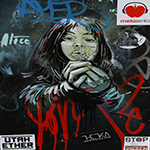Euroacademia Conferences
 Europe Inside-Out: Europe and Europeanness Exposed to Plural Observers (9th Edition) April 24 - 25, 2020
Europe Inside-Out: Europe and Europeanness Exposed to Plural Observers (9th Edition) April 24 - 25, 2020 Identities and Identifications: Politicized Uses of Collective Identities (9th Edition) June 12 - 13, 2020
Identities and Identifications: Politicized Uses of Collective Identities (9th Edition) June 12 - 13, 2020 8th Forum of Critical Studies: Asking Big Questions Again January 24 - 25, 2020
8th Forum of Critical Studies: Asking Big Questions Again January 24 - 25, 2020 Re-Inventing Eastern Europe (7th Edition) December 13 - 14, 2019
Re-Inventing Eastern Europe (7th Edition) December 13 - 14, 2019 The European Union and the Politicization of Europe (8th Edition) October 25 - 26, 2019
The European Union and the Politicization of Europe (8th Edition) October 25 - 26, 2019 Identities and Identifications: Politicized Uses of Collective Identities (8th Edition) June 28 - 29, 2019
Identities and Identifications: Politicized Uses of Collective Identities (8th Edition) June 28 - 29, 2019 The European Union and the Politicization of Europe (7th Edition) January 25 - 26, 2019
The European Union and the Politicization of Europe (7th Edition) January 25 - 26, 2019 7th Forum of Critical Studies: Asking Big Questions Again November 23 - 24, 2018
7th Forum of Critical Studies: Asking Big Questions Again November 23 - 24, 2018 Europe Inside-Out: Europe and Europeanness Exposed to Plural Observers (8th Edition) September 28 - 30, 2018
Europe Inside-Out: Europe and Europeanness Exposed to Plural Observers (8th Edition) September 28 - 30, 2018 Identities and Identifications: Politicized Uses of Collective Identities (7th Edition) June 14 - 15, 2018
Identities and Identifications: Politicized Uses of Collective Identities (7th Edition) June 14 - 15, 2018
Alter Identities: The Rise and Fall of the American Superhero in Underground Comix
-
-

-
Presentation speakers
- Matt Yockey, Department of Theatre and Film, University of Toledo
Abstract:
The rise of underground comix in the 1960s has been historically characterized simply as an iteration of the iconoclastic counterculture of the period. While the work of influential underground artist-writers such as Robert Crumb and Gilbert Shelton was certainly resisting the strictures of mainstream comic book industry production and censorship, it was also engaged in a productive and more complicated dialogue with the mainstream comic book culture it was ostensibly rejecting. As such, this paper will examine Wonder Wart-Hog, Shelton’s wry deconstruction of the comic book superhero, who appeared in such underground comix as Feds ‘n’ Heads, Radical AmerikaKomiks, and Rip OffComix. This character, a Superman parody, crystalized a contemporaneous ambivalence about the superhero as a bastion of truth, justice, and the American way felt by many young adults at the time who did not want to necessarily stop reading comic books but also could not take them seriously any more either. Shelton’s parody not only offers evidence of the ways in which the superhero was used at this time as a discursive political tool but it also reflects the ways in which the superhero was increasingly available in this period as a reflection of shifting cultural paradigms in America. For example, this period also saw the publication of an independent comic book, Bobman and Teddy (1966), which reimagined Robert and Teddy Kennedy as a Batman and Robin-styled pair of earnest crime fighters, and the release of the subversive art cinema superhero parodyMister Freedom(William Klein, 1969). Shelton’s character appeals to this zeitgeist as a means of speaking to a larger and growing ambivalence about what it meant to be American. Seismic shifts in American political culture were partially managed by pop culture icons such as comic book superheroes because such texts were readily available for a variety of ideological uses by producers and consumers alike. This paper will explore how the subversive status of the underground comix medium/genre exploited the intrinsic expressive liminality of the superhero genre to comment on and reflect the essential transformational spirit of consumer culture and the inherent malleability of an American identity, both especially potent in the mid to late 1960s.
-
Related Presentations

Poetic Self-Experience
- Laura Quinney

Performing Identity between Qualified and Disqualified Epistemologies
- Joshua P. L. Entsminger
















